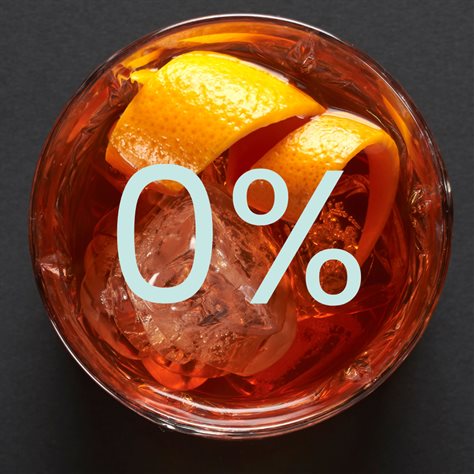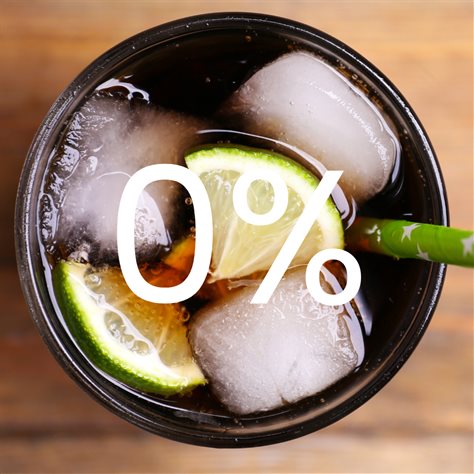There was a time, not too long ago when your choices were extremely limited if you were going to a bar, restaurant, or party and you wanted a sophisticated non-alcoholic drink. You could order a lime and tonic, ask for a soft drink in a glass, or hope that the establishment you were at had at least one non-alcoholic cocktail (also known as a mocktail) that wasn’t too sweet and packed with calories.
More recently, however, there’s been somewhat of a revolution in the no and low-alcohol (NoLo) drinks space. It’s now possible to walk down most supermarket aisles and buy a selection of non-alcoholic beers, wines, and spirits. Those same non-alcoholic drinks, along with increasingly sophisticated mocktails, are also readily available at restaurants, bars, hotels, and events.
The increased presence and visibility is reflected in the sector’s revenues too. According to IWSR, a trusted source of data and insight on the global beverage alcohol market, the no/low alcohol category value surpassed $11bn in 2022, up from $8bn in 2018. By 2026, the value of the no/low-alcohol category across 10 markets is expected to grow by more than a third, led mainly by alcohol-free products, and is projected to exceed $624bn by 2031. Small wonder then that even big alcohol brands are investing in the sector.
And while the South African no-alcohol sector is still in its infancy, there is clear and growing demand here too. According to a 2021 study, South Africa was set to experience annual sales growth of 16% or more in the years leading up to 2024. That put it on a higher growth trajectory than many rich world markets including Australia, Brazil, Canada, France, Germany, and Japan.
But what’s driving this growth? And how did zero-alcohol drinks capture the mainstream imagination?
A growing awareness of health and wellness
Part of the answer might lie in the same thing that helped catapult so many non-alcoholic drinks onto South African supermarket shelves in the first place. When the Covid-19 pandemic hit in early 2020, South Africa implemented one of the harshest lockdowns in the world, which included a ban on the sale of alcoholic beverages.
At the same time, the pandemic focused many people’s attention on the importance of their mental and physical wellbeing. In the US, for instance, NielsenIQ research found that 41% of drinkers choose no and low-alcohol drinks for reasons centred around health and wellness.
Even people in their late teens and early 20s, who tend to be less risk-averse than their older counterparts, are embracing the trend. According to research from NCS Solutions, 36% of US Gen Zs are going alcohol-free for their mental health. Similar trends can be seen in the UK, where a 2023 study found that 38% of Gen Zs hadn’t had a drink in the past year.
“There’s no doubt that people are increasingly aware of their physical and mental well-being and the effects that alcohol has on them,” says Ayanda Mvandaba, CEO of Drink Nil, an e-commerce retailer that specialises in non-alcoholic drinks. “Increasingly, young people in particular are now growing up in a world where this kind of well-being is being celebrated. They’ve also grown up on social media, where wellness influencers boast millions of followers.”
Greater choice and availability
Another significant factor in the growth of the no-alcohol space is simply greater choice and availability.
In the UK, for instance, 25% of drinkers say that greater availability led them to increase their low and no alcohol consumption. There are still frustrations though, with 17% saying that there is not enough choice in no and low-alcohol drinks. Even when there is a choice, availability can also be a problem, as anyone who’s struggled to find their favourite non-alcoholic beer, wine, or spirit in their local supermarket will tell you.
It’s precisely these frustrations that led Mvandaba to acquire Drink Nil in the first place and had visions to grow their offering
“When I was pregnant, I was frustrated with the lack of non-alcoholic drinks available in most retailers and restaurants,” she says. “What made it even more frustrating was that I knew there were great non-alcoholic brands out there. So when I found Drink Nil, I was excited about the fact that it brought many of those brands together in one convenient online location.”
You don’t have to quit drinking entirely
Mvandaba’s experience also provides another insight into the growth of the low and no-alcohol market: you don’t have to give up drinking entirely to take part in the NoLo movement. Whether you’re pregnant, acting as a designated driver, or just don’t feel like drinking that day, no-alcohol drinks mean that you never have to feel left out during a social occasion. Mvandaba says: “Just because one chooses to swap out for a non-alcoholic gin or beer doesn’t mean that the party is not over. It is just different.”
This blended approach is borne out by the numbers too. According to NielsenIQ research, 82% of non-alcohol drinks buyers also buy alcohol-containing beer, wine or spirits. Globally, meanwhile, just 17% of drinkers abstain from alcohol entirely.
“We are calling this category of consumers blenders – the ones who do consume alcohol but choose to also consume no or low alcohol beverages at certain times. Ultimately, it’s about choice,” says Mvandaba. “You can choose to abstain from alcohol entirely or only when it’s necessary or you feel like it. Whatever choice you make, however, you should have access to the same kind of taste, packaging, and experience (minus the intoxication) that you do if you drink alcohol.”




































